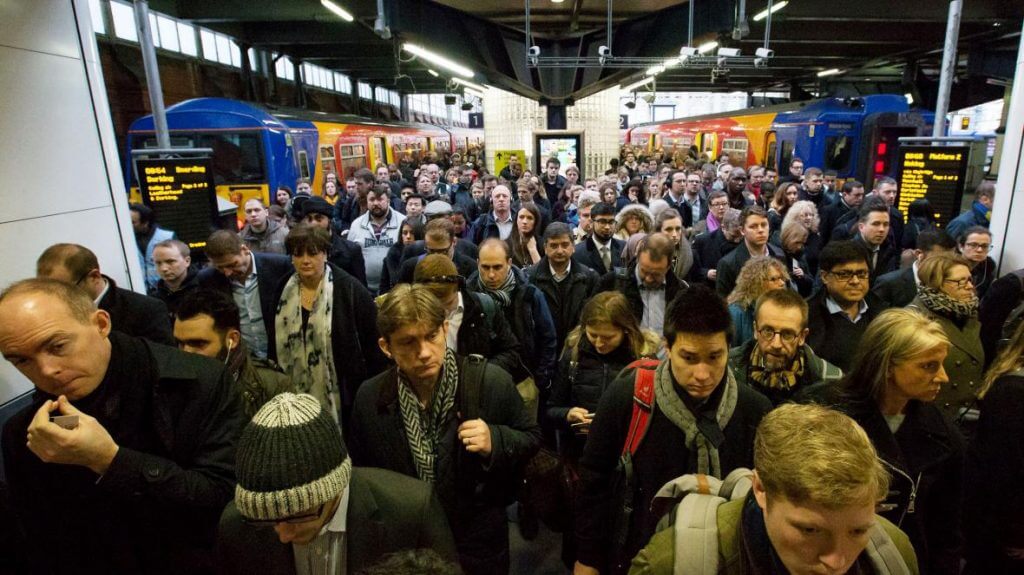
“The mass of men lead lives of quiet desperation.” – Thoreau
This quote has always been powerful for me in checking in with myself (and clients, friends, family) as to how “in balance” I feel. Early in my journey of daily writing on this site, in “Doing from Being” I mused:
“we can choose to focus on being present to the moments and to sensing “who am I being?” in everything we do. From this, the self-awareness and self-knowledge grow, and from that one can make choices of what to “do”.
So, perhaps we don’t lead lives of “quiet desperation”, but it is important for each of us to “check-in” on whether we feel resigned, our senses dulled, and the impact this may have on us and those around us.
However, it appears that “quiet desperation” is far more commonplace than we imagine, as starkly highlighted in a powerful article by Matt Rudd in the Sunday Times in December 2018, called: “Why aren’t successful, middle-aged fathers happy?“, as well as add a few thoughts of my own.
Waterloo station, a commuter train station and one of the busiest in London. is one I go through several times a week. Regular readers may know or sense that I do not commute as a routine and also look to avoid the “commuter hours”. However, at times when I do find myself at Waterloo station in those busiest times, the pervading energy I sense is indeed one that Thoreau would identify as “quiet desperation”.
The Sunday Times article on middle-aged men commuting through Waterloo, therefore, resonated really powerfully for me. The first story told is of a man in his mid-40s with health problems:
“I’d stop tomorrow and go into teaching or something,” he said. “But I guess it’s just easier to keep waking up and getting on the train. I need something to happen to make me stop.”
“Like a serious health problem?”
“Like redundancy.”
“Are you happy?” I asked him. This is not the sort of question that normally comes into our conversation. It was also not a question he had ever really considered. After a long pause, he said: “No. But who is?”
Thud. How awful, yet how common, it appears.
..men in the UK are three times more likely to take their own life than women. Men aged 45-49 have the highest rate of suicide, nearly four times that of women the same age. Analysis by the Office for National Statistics shows that middle-aged people in general have the lowest levels of personal wellbeing, reporting high levels of anxiety and low levels of happiness and life satisfaction. Middle-aged men are even less happy and less satisfied than unhappy, unsatisfied middle-aged women. The evidence is clear and ironic: the system set up by men for men isn’t working for them either.
I’ve interviewed scores of middle-aged working fathers. I deliberately sought out those who were, on paper, privileged and successful ……. Are they happy? Apart from one or two, no — no, they aren’t. More striking still, most of them admit they very rarely think about happiness. “I can’t,” says one. “If I start worrying about the meaning of life, I’ll go mad. I just have to keep going.”
This is all really depressing to me, yet all too familiar, both from my own personal past experience and from friends and family members. The article goes on to list example after example of men who feel they have no choice and only one or two who have chosen to make what felt like radical change.
So, do these men have a choice? Yes. We always have a choice. About a decade ago I was introduced to what undoubtedly remains the most powerful book I have ever read, “Man’s Search for Meaning” by Viktor Frankl. I give you this quote:
Between Stimulus and Response There Is a Space. In That Space Is Our Power To Choose Our Response. In our Response lies our Growth and our Freedom.
What Frankl tells us is that we always have a choice. Yes, every choice has consequences, some of those feel scary and we may not feel brave enough to make them. We also often rationalise this lack of choice out of fear of change and the discomfort that comes with it.
As Suki Smith taught me: “Awareness is the greatest agent for change”. I hope this article brings you some awareness.
Also, at the time of writing this piece, I am also working on the latest “long read” to go out as one of my periodic newsletters under the theme of #OpenLeadership, giving ideas, strategies and tools for leaders for themselves and their organisations. This next one will be on Bravery. I encourage you to sign up for this and you will receive it as soon as it is complete.
